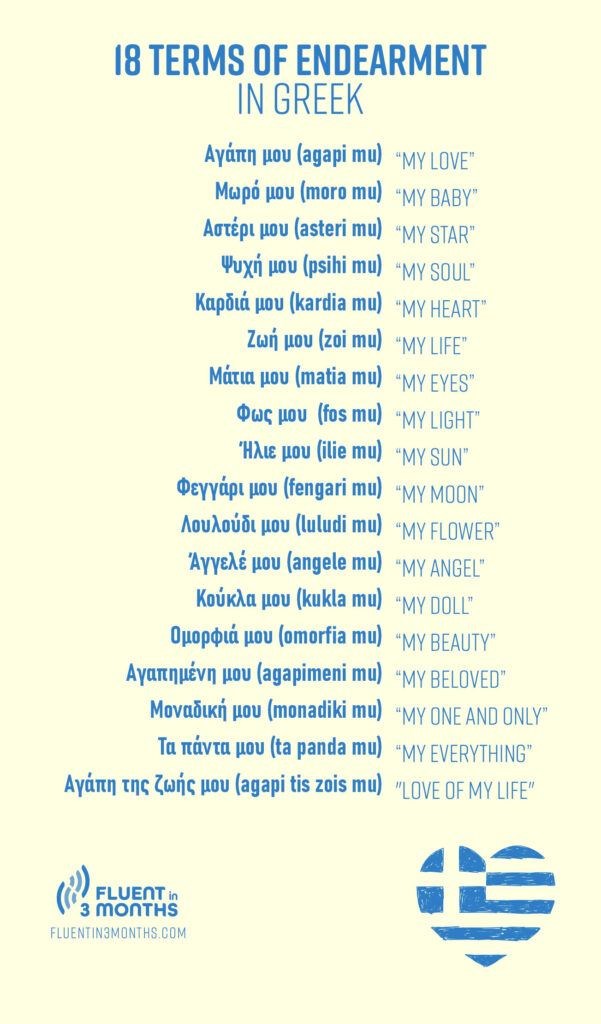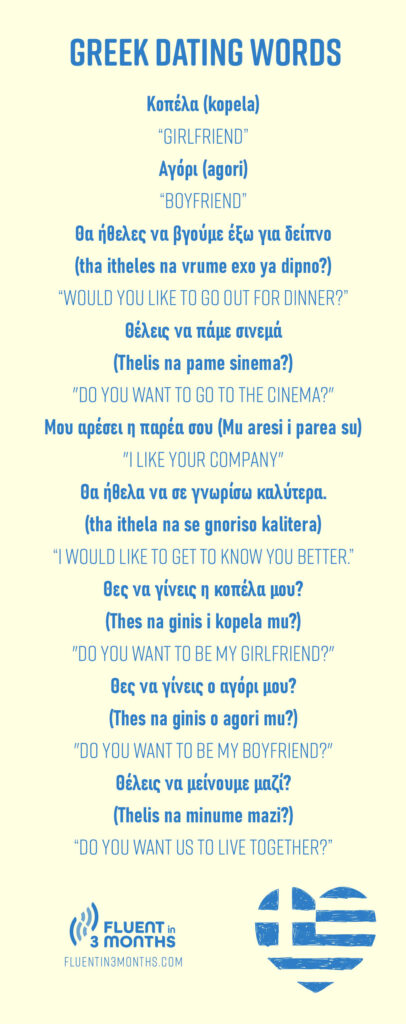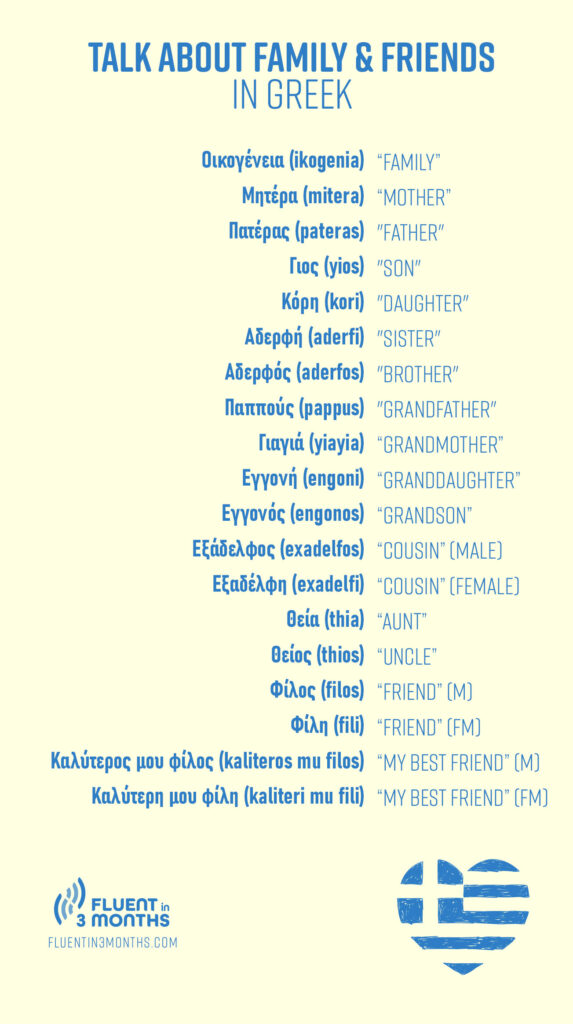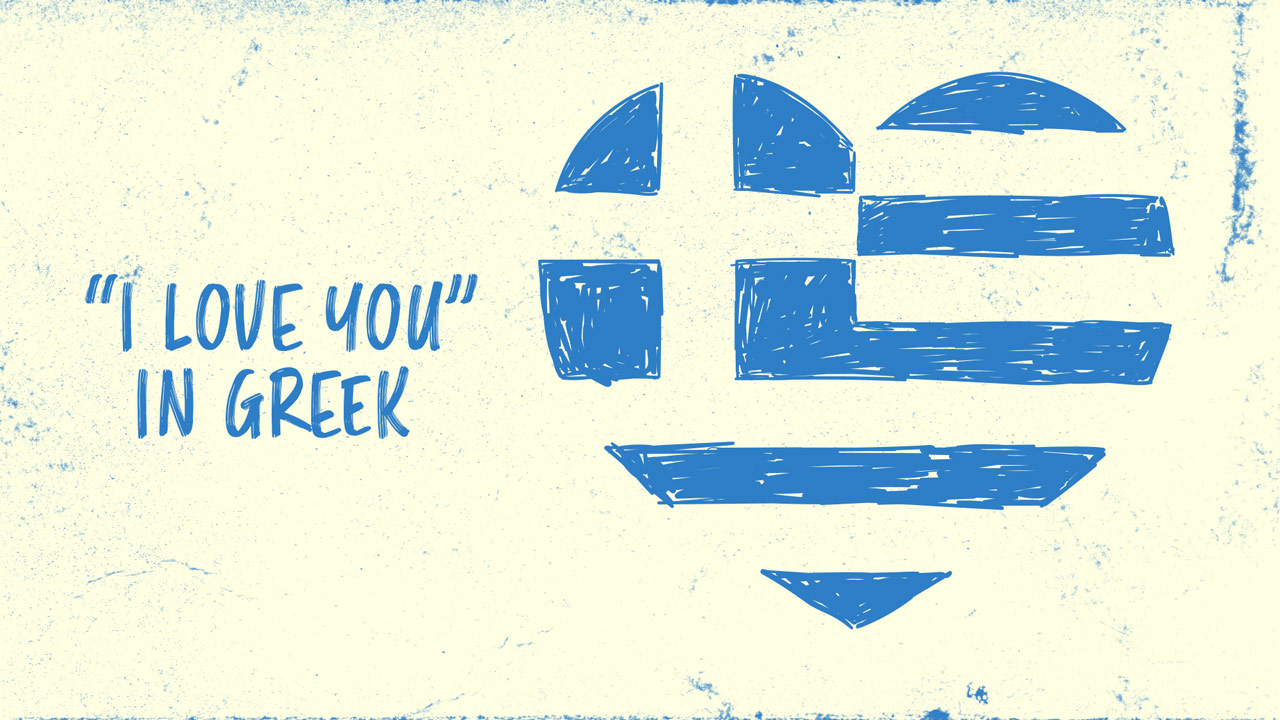How to Say “I Love You” in Greek (+ 53 More Romantic Greek Phrases)
“I love you” in Greek is Σ’αγαπώ (S’agapo).
But there’s lots more you can learn if you want to express your romantic feelings in the Greek language…
Did you know that ancient Greeks differentiated between four different types of love? These are eros, philia, storgi and agape.
They also recognised Eros, the God of Love, and Aphrodite, the Goddess of Love. Originating from the Ancient Greek language, Modern Greek, spoken in Greece, Cyprus, and other European countries, also has some creative love words and many romantic ways of saying “I love you.”
In this article, we will cover over 50 Greek love words, phrases, and their pronunciations. So if you’re looking to impress your Greek-speaking partner, friend, or family member, you’re in the right place.
After breaking down how to say “I love you” in Greek, I’ll move on to 50+ other Greek romantic words and phrases. Let’s get started!
Table of contents
- How Do You Say “I Love You” in Greek?
- What Are the 4 Greek Words for Love?
- How to Say “My Love” in Greek
- How to Use the Diminutive Form in Greek?
- 20 More Romantic Phrases in Greek
- How to Say Girlfriend and Boyfriend in Greek
- How to Say Husband and Wife in Greek
- Talking About Family Members and Friends in Greek
- Share the Love in Greek
How Do You Say “I Love You” in Greek?
As mentioned before, “I love you” in Greek is Σ’αγαπώ (S’agapo).
Here, Σε (se) means “you,” and αγαπώ (agapo) means “I love.” This is the most common phrase to say “I love you” in Greek, and you can use it for your family, close friends, and partner.
If you want to say “I love you very much,” you only need to add πολύ (poli) to the end, so it would be s’agapo poli.
What Are the 4 Greek Words for Love?
As pioneers in philosophy, the Ancient Greeks thought a lot about love and how to describe different types of it. According to their philosophy, there are four different types of love : eros, philia, storgi and agape.
Ἔρως (eros)
You might have heard of Eros, the Greek God of Love, or its Roman counterpart Cupid. Portrayed as a young, beautiful boy, he uses his bow and an arrow to make people fall in love. So eros for Ancient Greeks, is passionate and romantic love, one you feel when you’re in love.
Φιλία (philia)
In Greek, φιλία means “friendship,” so this word talks about the love between friends. It’s built on mutual trust, loyalty, and respect. Unlike eros, physical attraction is not a part of this type of love.
Στοργή (storgi)
Storgi is natural love. It is familial and instinctual, like the affection parents feel for their children. Or what we might feel toward something that is familiar and expected. According to writer and theologian C. S. Lewis, this is the most common type of love we experience, even though we don’t know how to label it.
Aγάπη (agape)
Agape is unconditional love, associated with the love of God. It involves kindness, charity, and a genuine concern for the well-being of others. In Modern Greek, αγάπη (agapi) means love in general. You can use it for your family, friends, or partner, just like how you can use s’agapo to say “I love you.”
How to Say “My Love” in Greek
“My love” in Greek is αγάπη μου (agapi mu).
The Greek language also uses diminutives to make words cuter. So to say “my love” in a cuter way, you can say αγαπούλα μου (agapula mu), meaning “my little love.” More on diminutives a bit later!
In Greek, μου (mu) means “my.” You add it at the end of words, not in the beginning like in English. Here are some common Greek endearment words you can use instead of agapi mu:
- Aγάπη μου (agapi mu): “My love”
- Mωρό μου (moro mu): “My baby”
- Aστέρι μου (asteri mu): “My star”
- Ψυχή μου (psihi mu): “My soul”
- Καρδιά μου (kardia mu): “My heart”
- Ζωή μου (zoi mu): “My life”
- Μάτια μου (matia mu): “My eyes”
- Φως μου (fos mu): “My light”
- Ήλιε μου (ilie mu): “My sun”
- Φεγγάρι μου (fengari mu): “My moon”
- Λουλούδι μου (luludi mu): “My flower”
- Άγγελέ μου (angele mu): “My angel”
- Κούκλα μου (kukla mu): “My doll”
- Oμορφιά μου (omorfia mu): “My beauty”
- Aγαπημένη μου (agapimeni mu): “My beloved”
- Μοναδική μου (monadiki mu): “My one and only”
- Τα πάντα μου (ta panda mu): “My everything”
- Αγάπη της ζωής μου (agapi tis zois mu): “Love of my life”

How to Use the Diminutive Form in Greek?
Using the diminutive form to express love in Greek is very common.
This is done by adding suffixes such as –άκι (aki), –ίτσα (itsa), –ούλης (ulis), –ούλα (ula), and -άκης (akis). When they come to the end of the word, they convey the connotation of “small” or “little.”
The suffix you add depends on the word. Let’s add the right diminutive suffixes to some of the examples above:
- Καρδιά μου (kardia mu) + –ούλα (ula): καρδούλα μου (kardula mu) — “My little heart”
- Μωρό μου (moro mu) + –άκι (aki): μωράκι μου (moraki mu) — “My little baby”
You can also use diminutive suffixes with names. For example, Γιώργος (Yiorgos) becomes Γιωργάκης (Yiorgakis), and Σοφία (Sofia) becomes Σοφάκι (Sofiaki). By adding mu to the end, you can say Yiorgakis mu (“my little Yiorgos”) or Sofiaki mu (“my little Sofia”).
20 More Romantic Phrases in Greek
Let’s top our knowledge up with more romantic phrases. In this part, you’ll find a comprehensive list of phrases, with varying levels of intensity.
- Σ’αγαπώ μέχρι το φεγγάρι και ξανά πίσω (s’agapo mehri to fengari ke xana piso): “I love you to the moon and back”
- Κι εγώ σ’ αγαπώ (ki ego s’agapo): “I love you too”
- Μου αρέσεις (mu aresis): “I like you”
- Σε λατρεύω (se latrevo): “I adore you”
- Μου λείπεις (mu leepis): “I miss you”
- Σημαίνεις πολλά για μένα (simenis polla yia mena): “You mean a lot to me”
- Είσαι τo άλλο μου μισό (eeseh to allo mu miso): “You are my other half”
- Με ολοκληρώνεις (me oloklironis): “You complete me”
- Είσαι η αδελφή ψυχή μου (eeseh i adelfi psihi mu): “You are my soulmate”
- Θέλω να είμαι μαζί σου (thelo na eemeh mazi su): “I want to be with you”
- Δεν μπορώ να ζήσω χωρίς εσένα (den boro na ziso horis esena): “I cannot live without you”
- Θα είμαι πάντα εδώ για εσένα (tha eemeh panda edo yia esena): “I will always be here for you”
- Θέλω εμάς να είμαστε μαζί (Thelo emas na imaste mazi): “I want us to be together”
- Είσαι η ζωή μου (Eeseh i zoi mu): “You are my life.”
- Είσαι πανέμορφη (eeseh panemorfi): “You are very beautiful”
- Είσαι πανέμορφος (eeseh panemorfos): “You are very handsome”

Keep in mind that Greek has grammatical genders so for some phrases, you might need to change the endings depending on your gender or your partner’s gender. Here are some examples:
- Νιώθω τόσο τυχερός που σε έχω (Niotho toso tiheros pu se eho): “I feel so lucky to have you” (you say this if you’re male)
- Νιώθω τόσο τυχερή που σε έχω (Niotho toso tiheri pu se eho): “I feel so lucky to have you” (you say this if you’re female)
- Είμαι ερωτευμένος μαζί σου (eemeh erotevmenos mazi su): “I’m in love with you.” (you say this if you’re male)
- Είμαι ερωτευμένη μαζί σου (eemeh erotevmeni mazi su): “I’m in love with you.” (you say this if you’re female)
How to Say Girlfriend and Boyfriend in Greek
Besides these romantic phrases, you might also want to know how to say girlfriend and boyfriend in Greek and learn new words that would be useful for a date and beyond.
- Κοπέλα (kopela): “Girlfriend”
- Αγόρι (agori): “Boyfriend”
- Θα ήθελες να βγούμε έξω για δείπνο (tha itheles na vrume exo ya dipno?): “Would you like to go out for dinner?”
- Θέλεις να πάμε σινεμά (Thelis na pame sinema?): “Do you want to go to the cinema?”
- Μου αρέσει η παρέα σου (Mu aresi i parea su): “I like your company”
- Θα ήθελα να σε γνωρίσω καλύτερα. (tha ithela na se gnoriso kalitera): “I would like to get to know you better.”
- Θες να γίνεις η κοπέλα μου; (Thes na ginis i kopela mu?): “Do you want to be my girlfriend?”
- Θες να γίνεις ο αγόρι μου; (Thes na ginis o agori mu?) “Do you want to be my boyfriend?”
- Θέλεις να μείνουμε μαζί; (Thelis na minume mazi?): “Do you want us to live together?”

How to Say Husband and Wife in Greek
If Greek is your partner’s first language, you already have a great reason to learn the language. Many people learn a new language for their partners which helps them communicate and connect on a deeper level.
- Γυναίκα (gineka): “Wife”
- Σύζυγος (sizigos): “Husband”
- Σύντροφος (sintrofos): “Partner”
- Θα με παντρευτείς; (tha me pandrevtis?): “Will you marry me?”
- Θέλω να περάσουμε την υπόλοιπη ζωή μας μαζί. (Thelo na perasume tin ipolipi zoi mas mazi): “I want to spend the rest of our lives together.”
Talking About Family Members and Friends in Greek
So far, we covered eros and learned what to call our significant other. What about filia, the friendly love, and storgi, the familial love? Here are some vocabulary for family and friends:
- Οικογένεια (ikogenia): “Family”
- Μητέρα (mitera): “Mother”
- Πατέρας (pateras): “Father”
- Γιος (yios): “Son”
- Κόρη (kori): “Daughter”
- Αδερφή (aderfi): “Sister”
- Αδερφός (aderfos): “Brother”
- Παππούς (pappus): “Grandfather”
- Γιαγιά (yiayia): “Grandmother”
- Εγγονή (engoni): “Granddaughter”
- Εγγονός (engonos): “Grandson”
- Εξάδελφος (exadelfos): “Cousin” (male)
- Εξαδέλφη (exadelfi): “Cousin” (female)
- Θεία (thia): “Aunt”
- Θείος (thios): “Uncle”
- Φίλος (filos): “Friend” (male)
- Φίλη (fili): “Friend” (female)
- Καλύτερος μου φίλος (kaliteros mu filos): “My best friend” (male)
- Καλύτερη μου φίλη (kaliteri mu fili): “My best friend” (female)

Share the Love in Greek
When you date someone who speaks another language, you learn the language in a more authentic way.
Similarly, if you have Greek-speaking family members or friends, you have a golden opportunity to practice. Start by calling your partner agapi mu, your grandfather papuli mu, or your best friend file mu and let them teach you the rest!
If you want to impress your loved ones further, make sure to check these free resources to learn Greek online. Καλή τύχη! “Good luck!”



Social